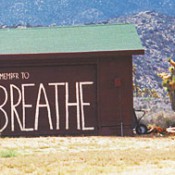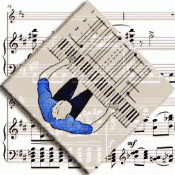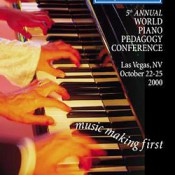
Jan 012014


 As beginners, children and adult piano students bring different mental abilities to the task of understanding music notation. As a result, I expect different paths for each group. Adults understand the concepts of note and rhythm faster than children do. They should, for adults’ minds, unlike children’s, are conceptual in nature. On the other hand, it’s hard for adults to grasp that notation is ultimately about sound and physical action. read the rest
As beginners, children and adult piano students bring different mental abilities to the task of understanding music notation. As a result, I expect different paths for each group. Adults understand the concepts of note and rhythm faster than children do. They should, for adults’ minds, unlike children’s, are conceptual in nature. On the other hand, it’s hard for adults to grasp that notation is ultimately about sound and physical action. read the rest  I spoke at the World Pedagogy Conference, 2000, in Las Vegas. I knew there would be plenty of really accomplished young people playing there. I also realized that if I brought one of my 50 year old adult students to play at this conference, one who started taking lessons at age 40, and in ten years learned to play as well as the kids playing there, nobody would care. read the rest
I spoke at the World Pedagogy Conference, 2000, in Las Vegas. I knew there would be plenty of really accomplished young people playing there. I also realized that if I brought one of my 50 year old adult students to play at this conference, one who started taking lessons at age 40, and in ten years learned to play as well as the kids playing there, nobody would care. read the rest  This installment of MusicalFossils is a series of e-mails written between Victoria (Vica) Achim, from Russia, and me. Most of them are hers. Vica is an adult amateur pianist studying in a culture where classical music is held in higher esteem than it is in the United States. Russia has (I do not know if this continues) a national system of musical education that seeks to find and develop the best and brightest young musicians as a national treasure, somewhat like athletes in the US. read the rest
This installment of MusicalFossils is a series of e-mails written between Victoria (Vica) Achim, from Russia, and me. Most of them are hers. Vica is an adult amateur pianist studying in a culture where classical music is held in higher esteem than it is in the United States. Russia has (I do not know if this continues) a national system of musical education that seeks to find and develop the best and brightest young musicians as a national treasure, somewhat like athletes in the US. read the rest